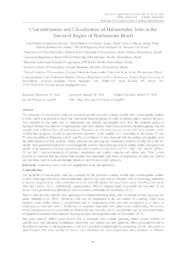Characterization and classification of halomorphic soils in the semiarid region of Northeastern Brazil.
Characterization and classification of halomorphic soils in the semiarid region of Northeastern Brazil.
Author(s): PESSOA, L. G. M.; FREIRE, M. B. G. dos S.; ARAUJO FILHO, J. C. de; SANTOS, P. R. dos; MIRANDA, M. F. A.; FREIRE, F. J.
Summary: The properties of halomorphic soils are controlled by the presence of either soluble salts, exchangeable sodium or both, and it is important to know and understand these properties in order to reforest and/or recover the soils. The objective of this study was to characterize and classify halomorphic soils from the semiarid region of Northeast Brazil. Four profiles of halomorphic soils were studied, which were described morphologically and the samples were collected from all soil horizons. Physical and chemical analyzes of the soils were carried out for classification purposes, as well as geochemical speciation of the soluble salts. According to the results, P1 and P3 were classified as Fluvisols, and P2 and P4 as Cambisols. It was observed that the studied soil profiles have the predominance of fine particles, which prevents the leaching and subsequent removal of salts from the soil profile. Soils presented high levels of exchangeable sodium, characterizing them as sodium solids throughout the profile. Ionic speciation analysis indicated the predominance of free forms of Ca2+, Mg2+, Na+ and K+, HCO3-, Cl- and SO42- and combinations of calcium, magnesium and sodium chloride and sulfate salts. Thus, it was possible to conclude that the studied halomorphic soils presented high levels of degradation by salts and sodium and that these types of soils are strongly related to the Fluvisols and Cambisols.
Publication year: 2019
Types of publication: Journal article
Unit: Embrapa Soils
Keywords: Saline soils, Sodic soils, Soil degradation, Solo Salino, Solo Sódico
Observation
Some of Embrapa's publications are published as ePub files. To read them, use or download one of the following free software options to your computer or mobile device. Android: Google Play Books; IOS: iBooks; Windows and Linux: Calibre.
Access other publications
Access the Agricultural Research Database (BDPA) to consult Embrapa's full library collection and records.
Visit Embrapa Bookstore to purchase books and other publications sold by Embrapa.

